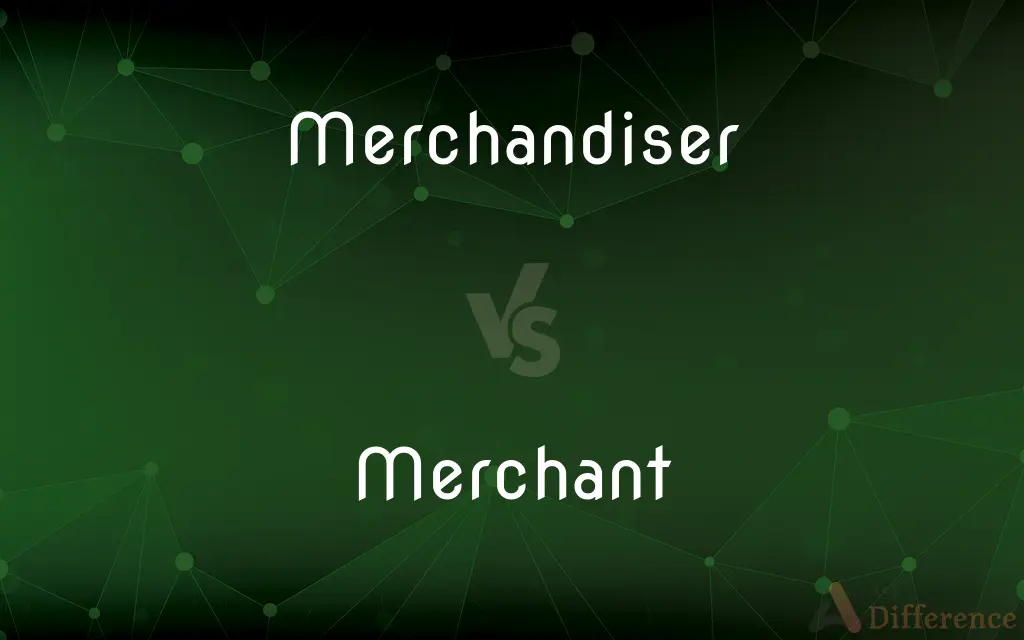Merchandiser vs. Merchant — What's the Difference?
Edited by Tayyaba Rehman — By Fiza Rafique — Updated on April 24, 2024
Merchandisers specialize in product promotion and placement within retail environments, focusing on maximizing sales, whereas merchants buy and sell goods commercially, managing broader business operations.

Difference Between Merchandiser and Merchant
Table of Contents
ADVERTISEMENT
Key Differences
A merchandiser works primarily within retail settings, focusing on the strategic display and promotion of products to increase consumer engagement and sales. In contrast, a merchant is involved in the broader scope of buying and selling goods, often overseeing the entire business operations from procurement to sales.
Merchandisers often collaborate with marketing teams to develop effective placement and promotional strategies that appeal to target audiences, whereas merchants may operate independently or own their businesses, dealing with suppliers, managing inventory, and handling customer transactions.
While merchandisers are typically employed by retail stores or product manufacturers to optimize product visibility and attractiveness, merchants can be retailers, wholesalers, or independent traders who own their stock and decide on sales tactics.
Merchandisers are focused on the 'how' and 'where' products are presented within a store to maximize sales potential, often using visual merchandising skills. On the other hand, merchants are concerned with the 'what' and 'how much', focusing on product selection, pricing strategies, and market trends.
In the retail industry, merchandisers play a crucial role in the implementation of in-store displays and promotional events to attract customers, whereas merchants are more involved in the business and financial aspects, including negotiation with suppliers and managing profitability.
ADVERTISEMENT
Comparison Chart
Role
Focuses on product placement and promotion
Buys and sells goods commercially
Key Responsibilities
Optimizing product displays, promotional strategies
Managing procurement, sales, inventory, finances
Setting
Usually employed by retail stores or manufacturers
Can be self-employed or operate a business
Skills Required
Visual merchandising, marketing insight
Business acumen, negotiation, market analysis
Outcome
Enhances consumer engagement and sales at retail
Manages business operations and profitability
Compare with Definitions
Merchandiser
An employee who collaborates with store management and vendors to align marketing strategies.
The merchandiser worked with vendors to secure prime shelf space for new products.
Merchant
An individual owner of a wholesale or retail trade business.
The merchant expanded her boutique's inventory to include designer handbags.
Merchandiser
A professional who optimizes product presentation in retail spaces to boost sales.
The merchandiser arranged the end-cap displays to highlight seasonal items effectively.
Merchant
A person involved in commercial transactions, often internationally.
The merchant imported specialty teas from Asia to sell locally.
Merchandiser
An individual skilled in planning and executing promotional activities within stores.
The merchandiser coordinated a product demo to increase customer interest.
Merchant
A businessperson who trades in goods that they buy and sell for profit.
The merchant stocked up on popular electronics ahead of the holiday rush.
Merchandiser
Someone responsible for the strategic placement of products to maximize visibility.
The merchandiser redesigned the store layout to improve the flow of customer traffic.
Merchant
A business operator focusing on strategic purchasing and sales decisions.
The merchant analyzed market trends to adjust his pricing strategy seasonally.
Merchandiser
A role focusing on increasing product attractiveness through visual displays.
The merchandiser updated the window displays monthly to reflect the latest trends.
Merchant
A role that requires managing relationships with suppliers and customers.
The merchant negotiated better terms with suppliers to increase his profit margins.
Merchandiser
A merchandiser is an arcade gaming device, which features a machine that contains a display of merchandise, which can be won by playing the game. In the trade, such games are described as "skill with prize" (SWP) games, and are a hybrid of games of skill and games of chance, with the preponderance of skill or chance differing between devices and often able to be set by the operator.
Merchant
A merchant is a person who trades in commodities produced by other people, especially one who trades with foreign countries. Historically, a merchant is anyone who is involved in business or trade.
Merchandiser
Goods bought and sold in business; commercial wares.
Merchant
A person or company involved in wholesale trade, especially one dealing with foreign countries or supplying goods to a particular trade
A builders' merchant
A tea merchant
Merchandiser
To buy and sell (goods).
Merchant
A person who has a liking for a particular activity
His driver was no speed merchant
Merchandiser
To promote the sale of, as by advertising or display
Merchandised a new product.
Merchant
(in historical contexts) relating to merchants or commerce
The growth of the merchant classes
Merchandiser
To buy and sell goods; trade commercially.
Merchant
One whose occupation is the wholesale purchase and retail sale of goods for profit.
Merchandiser
A trader, seller or merchant, especially in the retail trade.
Merchant
One who runs a retail business; a shopkeeper.
Merchandiser
An arcade machine which dispenses prizes to winners.
Merchant
Of or relating to merchants, merchandise, or commercial trade
A merchant guild.
Merchandiser
A trader.
Merchant
Of or relating to the merchant marine
Merchant ships.
Merchandiser
A businessperson engaged in retail trade
Merchant
A person who traffics in commodities for profit.
Merchant
The owner or operator of a retail business.
Merchant
A trading vessel; a merchantman.
Merchant
Someone who is noted for a stated type of activity or behaviour.
He's some kind of speed merchant — he drives way too fast.
Goal merchant Smith scored twice again in the match against Mudchester Rovers.
Merchant
(obsolete) A supercargo.
Merchant
As a resident of a region, to buy goods from a non-resident and sell them to another non-resident.
A merchanting service
Merchant
One who traffics on a large scale, especially with foreign countries; a trafficker; a trader.
Others, like merchants, venture trade abroad.
Merchant
A trading vessel; a merchantman.
Merchant
One who keeps a store or shop for the sale of goods; a shopkeeper.
Merchant
Of, pertaining to, or employed in, trade or merchandise; as, the merchant service.
Merchant
To be a merchant; to trade.
Merchant
A businessperson engaged in retail trade
Common Curiosities
What is the main focus of a merchandiser?
The main focus of a merchandiser is on maximizing the sales potential of products through effective presentation and promotional strategies within retail spaces.
Can a merchant be an online business operator?
Yes, merchants can operate online businesses, dealing with the buying and selling of goods over the internet.
Are merchandisers involved in purchasing products?
Merchandisers typically do not handle purchasing; their primary role is to enhance the sales of products already selected and stocked by the merchant or retail manager.
How does a merchant differ from a retail store owner?
A merchant can be a retail store owner, but they also might operate in wholesale or be involved in a range of other commercial buying and selling activities.
What skills are essential for a merchandiser?
Essential skills for a merchandiser include visual merchandising, understanding consumer behavior, and coordination with sales and marketing teams.
How do merchandisers impact consumer decisions?
Merchandisers impact consumer decisions by making products more appealing and accessible through strategic placement and attractive displays.
What kind of financial responsibilities does a merchant have?
Merchants handle financial responsibilities including budgeting, pricing strategies, and profit management.
What are the typical educational requirements for a merchant?
Merchants typically require business-related education, though many also succeed with extensive experience and practical knowledge in their trade.
What types of products do merchants deal with?
Merchants can deal with a wide variety of products, depending on their business model, including apparel, electronics, food products, and more.
What challenges do merchants face in their business?
Merchants face challenges such as fluctuating market demands, supplier reliability, and competition management.
How has technology impacted the roles of merchandisers and merchants?
Technology has significantly impacted both roles, enabling more effective inventory management, online marketing strategies, and customer interaction.
Can a merchant be involved in manufacturing?
Merchants typically are not involved in manufacturing; they focus more on buying and selling goods manufactured by others.
Is there a difference in the work environment between a merchandiser and a merchant?
Yes, merchandisers usually work within the retail environment, focusing on store layouts and displays, while merchants may work in various settings, including offices, markets, or online.
How do merchandisers and merchants collaborate?
Merchandisers and merchants collaborate to ensure that products are effectively marketed and sold, with merchandisers focusing on presentation and merchants on overall business strategy.
Do merchandisers need to understand customer demographics?
Yes, understanding customer demographics is crucial for merchandisers to effectively target marketing and display efforts.
Share Your Discovery

Previous Comparison
Greenhouse vs. Polytunnel
Next Comparison
Coffee vs. ToffeeAuthor Spotlight
Written by
Fiza RafiqueFiza Rafique is a skilled content writer at AskDifference.com, where she meticulously refines and enhances written pieces. Drawing from her vast editorial expertise, Fiza ensures clarity, accuracy, and precision in every article. Passionate about language, she continually seeks to elevate the quality of content for readers worldwide.
Edited by
Tayyaba RehmanTayyaba Rehman is a distinguished writer, currently serving as a primary contributor to askdifference.com. As a researcher in semantics and etymology, Tayyaba's passion for the complexity of languages and their distinctions has found a perfect home on the platform. Tayyaba delves into the intricacies of language, distinguishing between commonly confused words and phrases, thereby providing clarity for readers worldwide.
















































